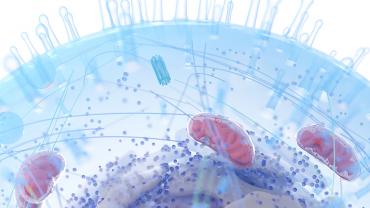
Cellular energy production occurs in the mitochondria, which are the tiny “energy factories” inside most cells. The molecule of nicotinamide adenine dinucleotide (NAD+) is required for the chemical reactions that create cellular energy in the mitochondria.
NAD+ is found in every living cell. In addition to aiding in cellular energy production, it plays a role in more than 500 reactions in the body, including gene expression, stress response, and DNA repair. In some studies, deficiencies of NAD+ have been linked to certain age-related diseases.
Supporting NAD+ status in the body may aid healthy aging. Animal and human studies have found an association between advanced age and significantly lower levels of NAD+. Studies have found an association between NAD+ deficiency and type 2 diabetes, Alzheimer’s disease (AD), other neurodegenerative disorders, cardiovascular disease, and various other age-related diseases.
Nicotinamide riboside (NR) is a variation of vitamin B3 (niacin). It functions as a building block for NAD+. Supplementation with NR has been shown to improve mitochondrial function, sirtuin activity, and increase NAD+ levels in multiple tissues. In both animal and human populations, twice-daily doses of 1,000 mg of NR were shown to significantly increase whole-blood levels of NAD+ and promote NAD+ metabolism.
In a clinical study, supplementation with 1,000 mg of NR for 9 days was shown to increase blood levels of NAD+ in healthy volunteers. An 8-week randomized double-blind controlled clinical trial explored the impact of NR supplementation on blood NAD+ levels at varying doses. NR as Niagen® was administered at 100 mg, 300 mg, and 1,000 mg dose levels. Within 2 weeks, significant increases in whole blood NAD+ levels were 22%, 51%, and 142%, respectively. No dose-dependent adverse events or incidences of flushing were reported.
A randomized controlled crossover clinical trial explored the efficacy of NR supplementation on skeletal muscle NAD+ metabolomics in older adults. Twelve individuals with a median age of 75 were randomized to a placebo or a treatment arm consisting of daily supplementation of 1,000 mg of NR for 21 days. NR was shown to increase skeletal muscle NAD+ and decrease certain pro-inflammatory cytokines, including IL-6, IL-5, IL-2, and tumor necrosis factor-alpha (TNF-α).
The presence of senescent cells and neuroinflammation have been associated with many age-related illnesses, such as AD. Neuroinflammation has been linked to reductions in NAD+ levels during the natural aging process. An animal study explored the impact of NR administration on mouse models of AD. Increases in NAD+ levels were observed. Decreases in the number of senescent cells and pro-inflammatory cytokines interleukin (IL)-6, IL-1β, and TNF-α were also reported.
NAD+ is found in every living cell and is essential to many important cellular processes, including energy production. Nicotinamide riboside is a molecule that may support healthy aging and cellular energy production.
By Colleen Ambrose, ND, MAT